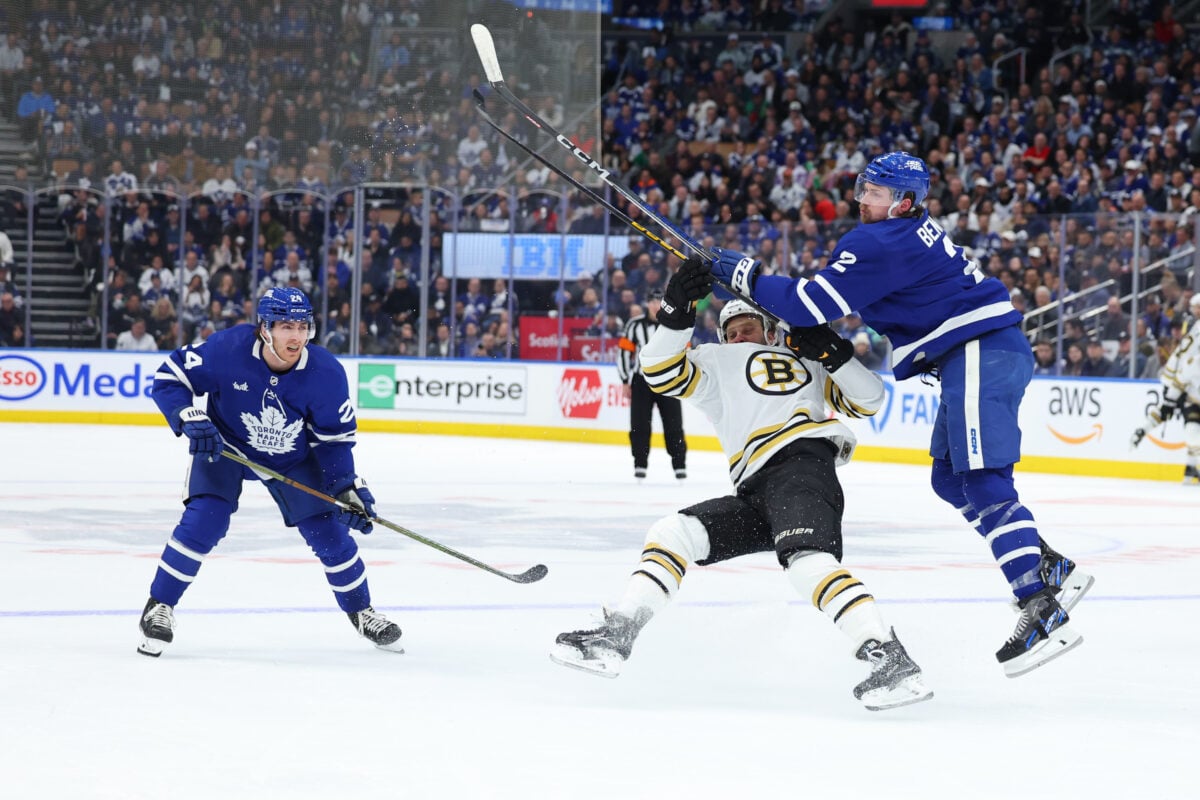For all the attention that the Toronto Maple Leafs‘ star forwards get — and they deserve — the real story in this series against the Ottawa Senators might be what’s happening at the other end of the ice. Under head coach Craig Berube, the Maple Leafs have embraced a blue-collar defensive identity that’s quietly powering them to success.
Related: Canadian Hockey Fans’ Complex Celebration of Ovechkin’s Historic Feat
It’s not flashy. It’s not sexy. But it’s winning playoff hockey.
Simon Benoît Leads a No-Frills Defensive Corps
Let’s start with Simon Benoît, the unlikely overtime hero in Game 2. A sixth defenceman by title only, Benoît has emerged as one of the most reliable stay-at-home blueliners in the NHL. He logged over 20 minutes in Game 2, and it wasn’t because of injuries or desperation. It was because he earned the trust.

Benoît doesn’t run the power play. He doesn’t dazzle with puck skills. He also makes mistakes. But he atones by winning puck battles, clearing the crease, and finishing checks without taking penalties. More importantly, he makes hard plays under pressure — exactly what playoff hockey demands.
Related: NHL Rumors: Holland to Islanders, Plus Rangers & Maple Leafs News
And in overtime, it wasn’t just his defensive awareness that showed up. Benoît broke up a risky cross-ice pass, quickly transitioned the puck, dropped it to Max Domi, and then kept skating to the net, setting a perfect screen. His game-winning sequence was a snapshot of everything Berube loves: responsible hockey, layered support, and execution under pressure.
Shot Blocking Has Become a Systemic Maple Leafs Statement
The Maple Leafs blocked 32 shots in Game 2; Ottawa blocked six. That’s not just an effort stat. It’s a buy-in stat. It shows that every skater, from stars like Mitch Marner to depth guys like Pontus Holmberg, is committed to collapsing the slot, protecting their goalie, and sacrificing their body.

Players like Jake McCabe and Chris Tanev are thriving in this structure. They’re boxing out better, clearing second-chance opportunities, and keeping things quiet in front of Anthony Stolarz. McCabe, in particular, has become a bit of a tone-setter. Game after game, he’s been throwing clean, punishing hits and letting opponents know the middle of the ice is no longer their runway.
Related: Maple Leafs’ Early Playoff Success Fueled by More Than the Core
Toronto’s top four D-men are logging heavy minutes, but they’re doing it smartly. They’re taking short shifts, making efficient clearing attempts, and getting support from forwards who are actually backchecking.
This isn’t just defence — it’s structure. And that starts with the coach.
The Maple Leafs’ Defence Is Showing Maturity Over Panic
One of the biggest knocks on previous Maple Leafs teams was how they crumbled under pressure. Turnovers, scrambling clears, missed assignments in the slot. Fans are not seeing that anymore, at least not often.
Berube’s system emphasizes calmness under pressure. When Ottawa presses, Toronto doesn’t overreact. They collapse inward, cut off the high-danger lanes, and wait momentarily to counter. Even when mistakes happen — and they will — the team doesn’t unravel. This team is clearly learning that kind of maturity and discipline is learned.

After giving up too many grade-A chances in Game 1, the Maple Leafs tightened dramatically in Game 2. They limited second-period rush chances, boxed out better, and got sticks into passing lanes. It was a textbook example of mid-series adjustment, and credit goes to both the coaching staff and the players for executing it quickly.
Is This Kind of Defensive Play Sustainable?
Here’s the big question: Can the Maple Leafs keep this play up? While 30-plus blocked shots in a game is remarkable, it doesn’t seem sustainable to do it every game through four playoff series. That’s thinking ahead, of course. However, logic suggests that the physical toll will eventually add up. But the identity? The structure? That’s sustainable. And it travels well.
Related: Berube’s Coaching Clinic Helps Maple Leafs Shut Down Senators
Berube’s teams don’t rely on home-ice matchups or hot streaks. They rely on repeatable habits, and these include defensive details. It’s the same way the St. Louis Blues won a Stanley Cup under him: layered defence, commitment from all five skaters, and just enough scoring to win the tight ones.
Right now, Toronto looks built to win those 2-1 and 3-2 games. That’s especially true with depth defenders like Benoît punching above their weight class.
Is This a New Era of Maple Leafs Hockey?
Maybe the most telling part of this evolution is how un-Leafs-like it feels. For years, Toronto was a high-event team, reliant on power plays and rush chances to win. Now, they’re comfortable winning low-event games — slowing it down, grinding it out, and frustrating their opponents.
And if this series continues the way it’s trending, it won’t be the stars who get all the credit. It’ll be the shot-blockers, the crease-clearers, and the unheralded depth guys—in other words, the blue-line, blue-collar Maple Leafs.
